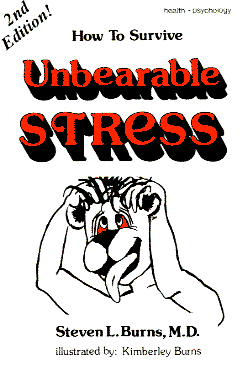Click here for
Recognizing Stress
Which of these is stress?
• You receive a promotion at work.
• Your car has a flat tire.
• You go to a fun party that lasts till 2:00 a.m.
• Your dog gets sick.
• Your new bedroom set is being delivered.
• Your best friend and his wife come to stay at your house for a week.
• You get a bad case of hay fever.
• All of the above.
ALL OF THESE ARE STRESS
If you are used to thinking that stress is something that makes you worry, you have the wrong idea of stress. Stress is many different kinds of things: happy things, sad things, allergic things, physical things. Many people carry enormous stress loads and they do not even realize it!
WHAT IS STRESS?
We are all familiar with the word "stress". Stress is when you are worried about getting laid off your job, or worried about having enough money to pay your bills, or worried about your mother when the doctor says she may need an operation. In fact, to most of us, stress is synonymous with worry. If it is something that makes you worry, then it is stress.
Your body, however, has a much broader definition of stress. TO YOUR BODY, STRESS IS SYNONYMOUS WITH CHANGE. Anything that causes a change in your life causes stress. It doesn't matter if it is a "good" change, or a "bad" change, they are both stress. When you find your dream apartment and get ready to move, that is stress. If you break your leg, that is stress. Good or bad, if it is a CHANGE in your life, it is stress as far as your body is concerned.
Even IMAGINED CHANGE is stress. (Imagining changes is what we call "worrying".) If you fear that you will not have enough money to pay your rent, that is stress. If you worry that you may get fired, that is stress. If you think that you may receive a promotion at work, that is also stress (even though this would be a good change). Whether the event is good or bad, imagining changes in your life is stressful.
Anything that causes CHANGE IN YOUR DAILY ROUTINE is stressful.
Anything that causes CHANGE IN YOUR BODY HEALTH is stressful.
IMAGINED CHANGES are just as stressful as real changes.
Let us look at several types of stress -- ones that are so commonplace that you might not even realize that they are stressful.......
Emotional Stress
When arguments, disagreements, and conflicts cause CHANGES in your personal life -- that is stress.
Illness
Catching a cold, breaking an arm, a skin infection, a sore back, are all CHANGES in your body condition.
Pushing Your Body Too Hard
A major source of stress is overdriving yourself. If you are working (or partying) 16 hours a day, you will have reducedyour available time for rest. Sooner or later, the energy drain on your system will cause the body to fall behind in its repair work. There will not be enough time or energy for the body to fix broken cells, or replace used up brain neurotransmitters. CHANGES will occur in your body's internal environment. You will "hit thewall," "run out of gas". If you continue, permanent damage may be done. The body's fight to stay healthy in the face of the increased energy that your are expending is major stress.
Environmental Factors
Very hot or very cold climates can be stressful. Very high altitude may be a stress. Toxins or poisons are a stress. Each of these factors threatens to cause CHANGES in your body's internal environment.
The Special Case of Tobacco UseTobacco is a powerful toxin!! Smoking destroys cells that clean your trachea, bronchi, and lungs. Smoking causes emphysema and chronic bronchitis, which progress to slow suffocation. The carbon monoxide from cigarette smoking causes chronic carbon monoxide poisoning. Tobacco use damages the arteries in your body, causing insufficient blood supply to the brain, heart, and vital organs. Cigarette smoking increases the risk of cancer 50 fold.Chewing tobacco or snuff is no safe haven. It also damages your arteries, and it carries the same cancer risk. (Cancers of the head and neck are particularly vicious, disfiguring, and deadly).
Poisoning the body with carbon monoxide, and causing the physical illnesses of emphysema, chronic bronchitis, cancer, and arterial damage, tobacco is a powerful source of added stress to one's life.
Hormonal Factors
PUBERTY
The vast hormonal changes of puberty are severe stressors. A person's body actually CHANGES shape, sexual organs begin to function, new hormones are released in large quantities. Puberty, as we all know, is very stressful.
PRE-MENSTRUAL SYNDROME
Once a woman passes puberty, her body is designed to function best in the presence of female hormones. For women past puberty, a lack of female hormones is a major stress on the body. Once a month, just prior to menstruation, a woman's hormone levels drop sharply. In many women, the stress of sharply falling hormones is enough to create a temporary OVERSTRESS. This temporary OVERSTRESS is popularly known as Pre MenstrualSyndrome (PMS).
POST-PARTUM
Following a pregnancy, hormone levels CHANGE dramatically. After a normal childbirth, or a miscarriage, some women may be thrown into OVERSTRESS by loss of the hormones of pregnancy.
MENOPAUSE
There is another time in a woman's life when hormone levels decline. This is the menopause. The decline in hormones during menopause is slow and steady. Nevertheless, this menopausal decline causes enough stress on the body to produce OVERSTRESS in many women.
Taking Responsibility for Another Person's Actions
When you take responsibility for another person's actions, CHANGES occur in your life over which you have little or no control. Taking responsibility for another person's actions is a major stressor.
Allergic Stress
Allergic reactions are a part of your body's natural defense mechanism. When confronted with a substance which your body considers toxic, your body will try to get rid of it, attack it, or somehow neutralize it. If it is something that lands in your nose, you might get a runny, sneezy nose. If it lands on your skin, you might get blistery skin. If you inhale it, you'll get wheezy lungs. If you eat it, you may break out in itchy red hives all over your body. Allergy is a definite stress, requiring large changes in energy expenditure on the part of your body's defense system to fight off what the body perceives as a dangerous attack by an outside toxin.
The Medical Basis of Stress, Depression, Anxiety,
Sleep Problems, and Drug Use
Explained in Fun, Easy to Read, Format





Stop and take the